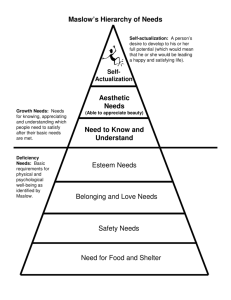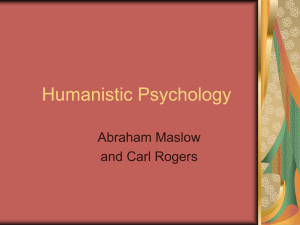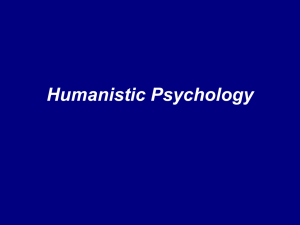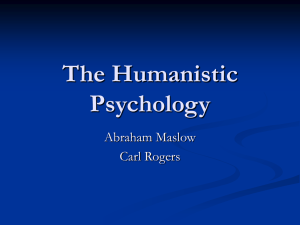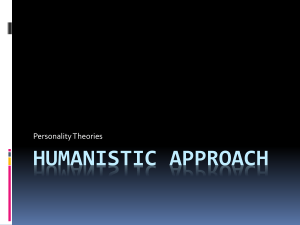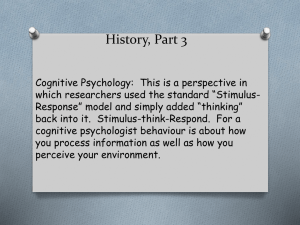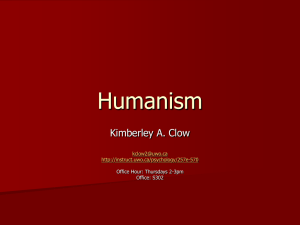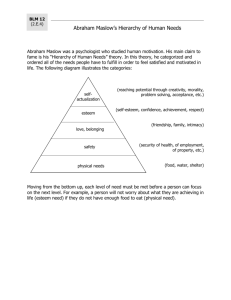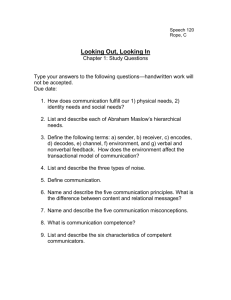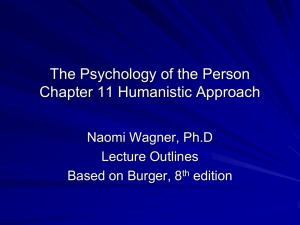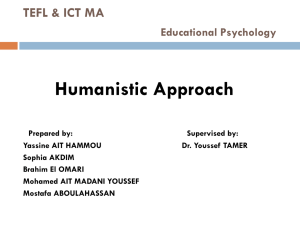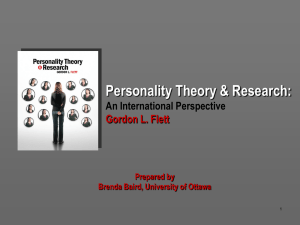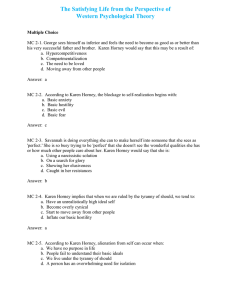self-actualize
advertisement
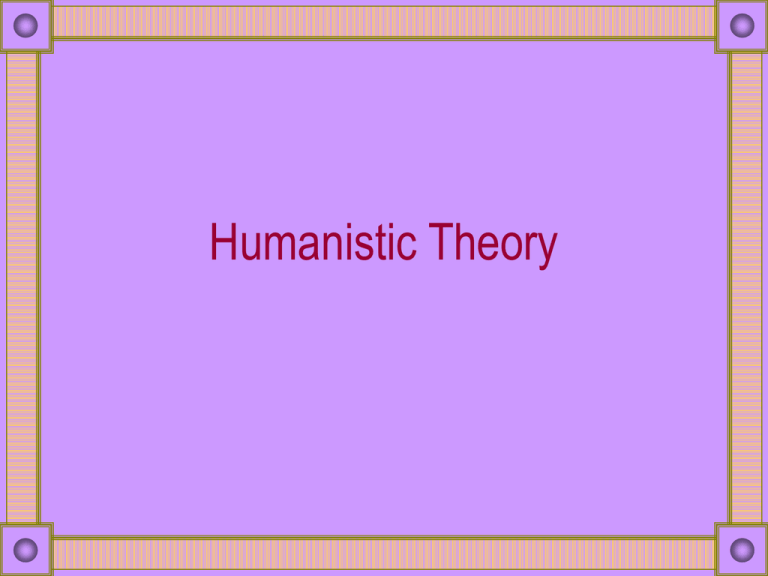
Humanistic Theory Humanistic Approach It encompasses phenomenological and existential approaches to human nature. - Phenomenological- focuses on subjective experience. - Existentialism - focuses on the authenticity, freedom, responsibility, and choice of the individual confronted with the threat of meaninglessness and non-existence. The height of its popularity was in the 1960s and 1970s, but it continues to have an important influence on the practice of clinical (and to a much lesser extent, academic) psychology. Humanistic personality theorists - Abraham Maslow - Carl Rogers - Rollo May Humanistic Approach (con’t) • The emphasis by Humanistic theorists such as Rollo May, Carl Rogers, and Abraham Maslow are different but they all agreed on a few basic points. • Unlike Freud, they believed in the inherent goodness of human nature i.e. If people could discover their "true self" (Rogers); if they could "self-actualize" (Maslow); if they had the "courage to be" (May)-then they would live whole, happy, worthwhile lives. • These theorists focused on the here and now,(the present) instead of the historical causes of behavior. Humanistic Approach (con’t) • This contrasts starkly with Freud's emphasis on past experience as determinants of all future behavior. • The humanistic psychologists claimed that people had responsibility, choice, and freedom in determining their own behavior (not the unconscious forces that control their behavior). • The humanistic psychologists believe that people could only be understood holistically (as wholes). Abraham Maslow Maslow is best known for his "hierarchy of needs,“ - Described a series of needs that people need to satisfy before they could reach their full potential. Maslow’s Humanist Pychology emphasizes personal growth,resilience, & the achievement of human potential. - Focuses on the whole person's subjective experience of life & on the person's potential for self-actualization (includes self- expression, creatively, connectedness, meaning, purpose, and direction in life.) • Maslow emphasized the particular needs that people need to satisfy before they could become self-actualized. Maslow's Hierarchy of Needs (con’t) • He organized these needs into a hierarchy, with the more basic, fundamental needs at the bottom and the more complex, self-actualizing needs at the top. • The levels of needs, in ascending order, are as follows: – Physiological needs: food, water, sleep, etc. – Safety needs: shelter, protection from attack, etc. – Belongingness and love needs: establishing social ties – Esteem needs: self-respect and respect from others – Self-actualization needs: self-expression, creativity, self-discovery, connectedness, and purpose. Maslow’s Hierarchy of Needs Self-Actualization Esteem Belongingness Safety Physiological Figure 13.1 Abraham Maslow's Hierarchy of Needs What’s important is…. • Each of the lower stages needs to be relatively satisfied first, before the individual can tackle the needs of the next higher level. • A person who has not satisfied basic physiological needs will not be able to work on establishing selfrespect. • According to Maslow satisfaction of each needs was only relative (a person could be somewhat hungry or sleep-deprived but still working towards self-actualization) and that multiple needs could contribute to a single action. Carl Rogers • Influence highly on views of psychotherapy: • He believe that the purpose of psychotherapy was to help patients find their "true selves." • For him, that meant helping patients discover & eliminate (as much as possible) the differences between the ways they thought, felt, and acted, & the ways they thought they should think, feel, and act; i.e. emphasizing on: – Unconditional Positive Regard • A situation in which the acceptance and love one receives from significant others is unqualified – Conditional Positive Regard • A situation in which the acceptance and love one receives from significant others is contingent upon one’s behavior • Rogers believed that human behavior and thoughts originated in their social judgments such as parents' scolding of a child's behavior. Carl Rogers (con’t) • The focus of Rogers' personality theory was the self. • As a psychotherapist, he repeatedly heard his patients talk about discovering, or losing, their "true selves." – WHAT DOES IT MEAN? • To make sense of this Roger differentiate between a person's behavior, thoughts, and feelings, on one hand, and their self-concept, on the other. • The self-concept consisted of a set of beliefs about behaviors, thoughts, and feelings that could be more or less discrepant, or incongruous, with the person's real behaviors, thoughts, and feelings. • A person whose self-concept was radically different from his true self would always be confuse constantly running into situations in which his behavior surprised or upset him. But, Why would someone develop such an inappropriate self- concept? • Rogers argued that the self-concept was strongly influenced by society. • And Society disapproves of a wide range of behaviors so many choose to ignore those behaviors in themselves -to leave them out of their self- concept, instead of integrating them into a holistic understanding of their behavior. • Therefore, the goal of Rogerian therapy is to help people discover their true selves by illuminating these "conditions of worth" and facilitating integration of previously-ignored aspects of the self. Carl Rogers’ Personality Theory The needs for self-actualization and positive regard create a potential for conflict. Rollo May • The most important concept for May was the "courage to be," – Meaning that each person need to take responsibility for his or her own choices even though constantly threatened by failure and, more importantly… – the possibility of non-being (death or dissolution). • According to May, personal growth and selfactualization were the result of courageously facing one's anxiety about non-being by choosing to act responsibly in the world. • Shared with humanists the belief in free will and freedom of choice but also emphasized loneliness, anxiety and alienation. • Extistentialism Free will confers on us responsibility for our actions. Evaluating Humanists • Difficulty in operationalizing define many of the concepts. • Humanists have added balance to the study of personality. • The approach has encouraged others to focus on “positive psychology.” • The argument that we have the power to choose our own destiny has fostered a new appreciation for resilience.
